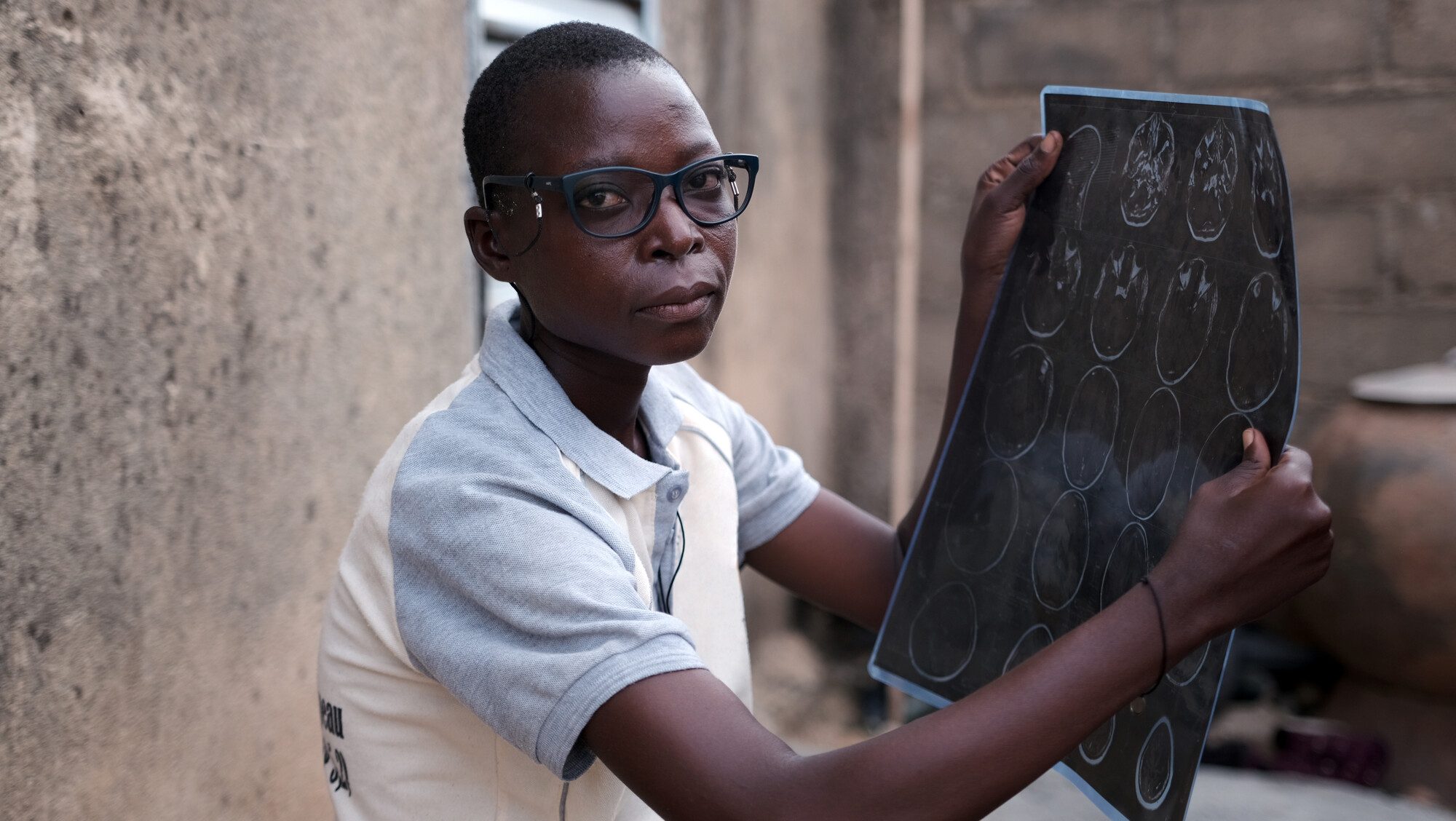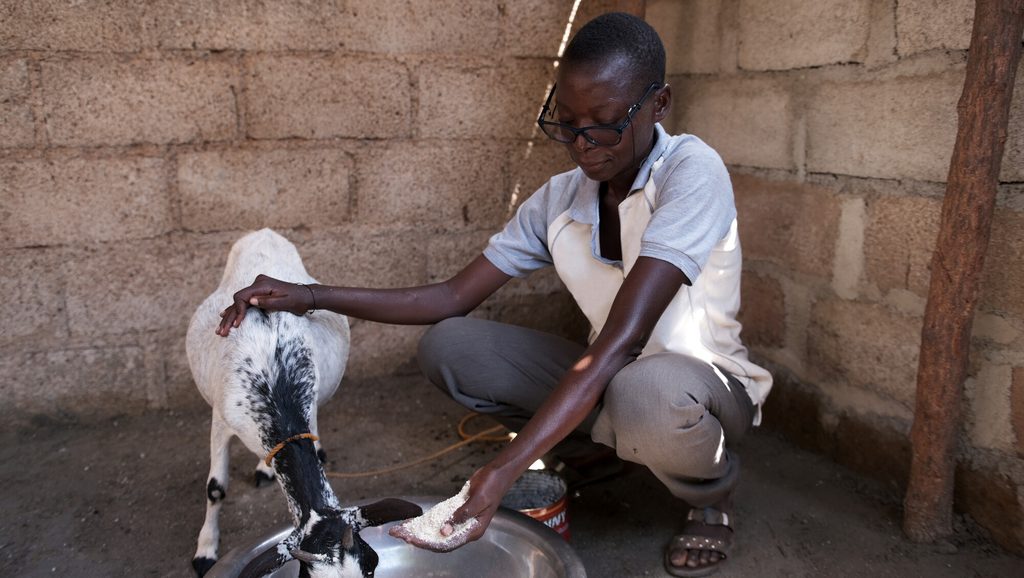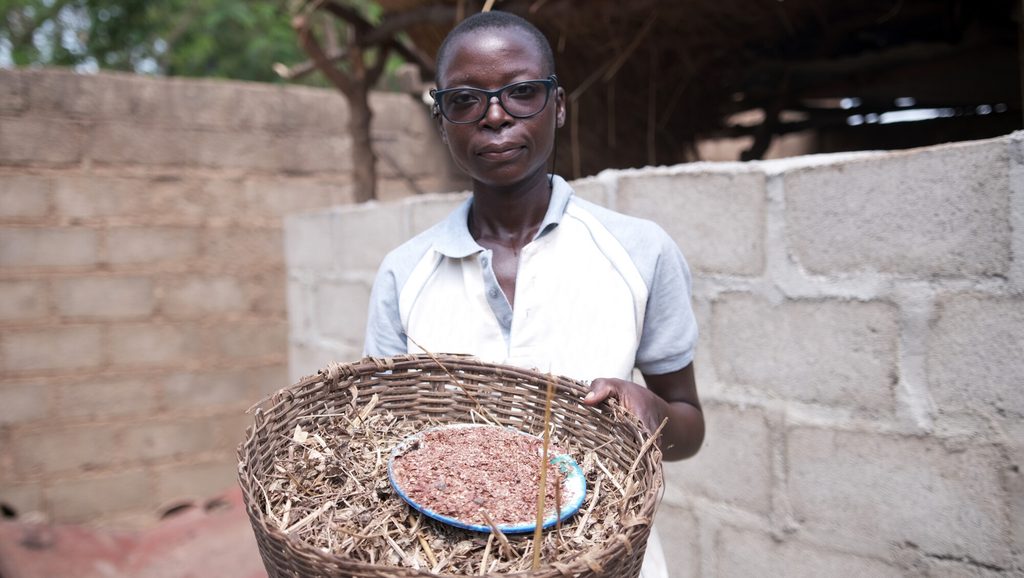Valentine, 30, is a role model in her community despite her disability. With training and some financial support, she was able to farm livestock to earn an income. But today, massive inflation is jeopardising her business.

Since the age of 3, Valentine has lived with a disability, leading to expensive medical care and social rejection. “Some people encourage me but others remind me of my condition,” she shares, explaining that she has difficulty walking and using her right arm and needs regular physiotherapy to prevent her muscles contracting.
Unlike most women her age, Valentine is not married, has no children and still lives with her parents. “A woman does not need a man by her side to live,” she says when asked about her marital status.
Skills training boosts business
Valentine is a livestock farmer. In a small pen built in the family yard, she keeps her goats, which she looks after and feeds to sell on the market. “Every morning I give them food and water before taking them outside. I sweep the pen every day. I have been paralysed but it doesn’t make me tired when I work. I am continuing with the treatments and my health is getting better.”
I’m a girl with a disability, but I can still do something to support myself. Even if I don’t succeed today, in the future I will be able to succeed.
Valentine, 30, goat breeder from Burkina Faso
Registered with social services by her uncle, Valentine was invited by Plan International at the beginning of 2022 to attend a series of training courses. “I was able to do all the practical exercises, it was good,” recalls Valentine, who had planned to become a livestock farmer for a long time. According to her, “There are no bad jobs in life.”

Valentine joined the technical and entrepreneurship training and was encouraged to create a business plan, which was selected by Plan International to be supported financially. Above all, she remembers the encouragement she received from the project team.
“They gave me advice first of all. They encouraged me to go forward, because life is not always easy, you have to fight to provide for yourself,” says Valentine, adding that Plan International’s support gave her confidence and she now goes out into town to talk to other livestock breeders and get advice.
Now the owner of 3 adult goats, Valentine plans to buy 2 more to increase her income. The sale of each animal can bring in between 8 and 15 euros. However, the hunger crisis in Burkina Faso has caused unprecedented inflation and is now jeopardising the business she has worked so hard to establish.
Vulnerable communities hit hard by inflation
Animal feed is very expensive, as are the medicines and vaccines for livestock. Valentine says, “I really notice that prices are increasing. For example, a dish of corn bran used to cost 500 francs, but now it’s 1000 francs. And you can’t even buy in bulk anymore. Sometimes, when you want 1 or 2 bags, the seller says that people have already reserved the bags, and he won’t sell them to you.”

For Valentine, the crisis has directly led to a drop in her income: “I don’t make as much profit anymore, and that doesn’t allow me to take my medicine and support myself.”
Alimata Sawadogo, Plan International’s project supervisor in Koupela, recently visited Valentine to check her progress. She says, “When I talk about Valentine, I immediately see a very courageous woman, a fighter in the sense that I’ve never seen a woman in this condition who fights so hard.”
A woman who doesn’t give up
According to Alimata, the support of the project is no longer enough. “Given her situation, I would like the support to go beyond what she has already received. We should continue to help her with her livestock activity so that she can have more animals and also with cash so that she can buy feed, as everything has become expensive on the market. This affects her monthly income. It’s really hard to get by.”
While waiting for possible support, Valentine keeps her head high and tells us: “I’m a girl with a disability, but I can still do something to support myself. I have to work very hard, more than the others. Even if I don’t succeed today, I know that in the future I will be able to succeed.”
Action needed to support hunger crisis-hit communities
In the face of the crisis, communities in the central Sahel are resilient. First to respond, our projects’ participants are making good use of the resources allocated to them and preparing for their future. But to date, programmes and funding have failed to address most of the challenges faced by vulnerable populations, as the hunger crisis worsens. Active and continuous mobilisation of international public opinion, governments, and donors is highly needed. As of October 2023, the humanitarian response plans in Niger, Burkina Faso, and Mali were only 42%, 33%, and 25% funded respectively according to OCHA.
